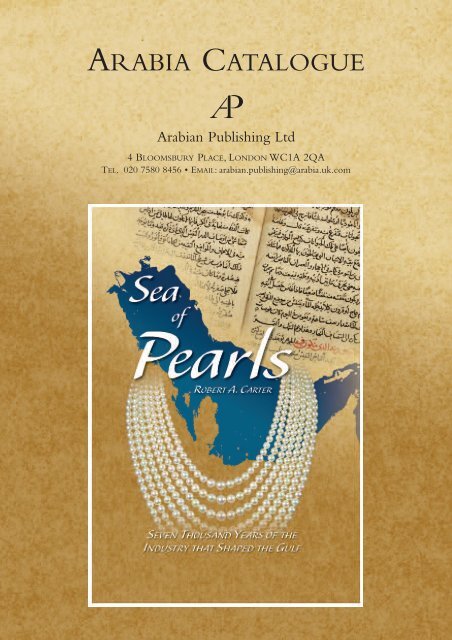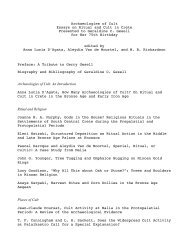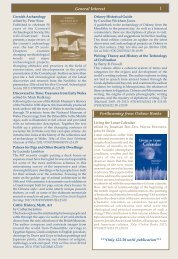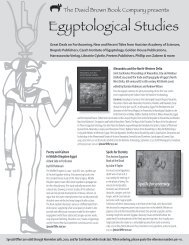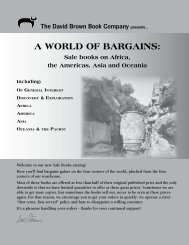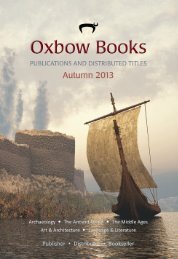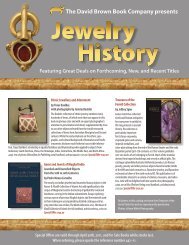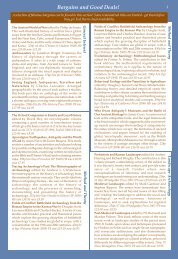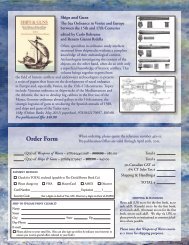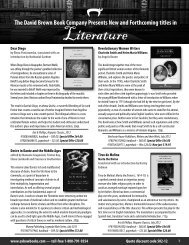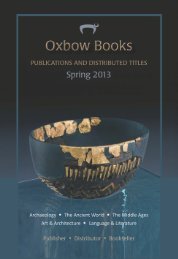You also want an ePaper? Increase the reach of your titles
YUMPU automatically turns print PDFs into web optimized ePapers that Google loves.
ARABIA CATALOGUE<br />
Arabian Publishing Ltd<br />
4 BLOOMSBURY PLACE, LONDON WC1A 2QA<br />
TEL. 020 7580 8456 • EMAIL: arabian.publishing@arabia.uk.com
Trade distribution<br />
Arabian Publishing Ltd<br />
4 Bloomsbury Place, London WC1A 2QA<br />
Tel. 020 7580 8456<br />
Email: arabian.publishing@arabia.uk.com<br />
• Middle East representation<br />
<strong>Oxbow</strong> <strong>Books</strong><br />
10 Hythe Bridge Street, Oxford, OX1 2EW, UK<br />
www.oxbowbooks.com<br />
Email: trade@oxbowbooks.com<br />
Tel. 01865 241249<br />
Fax 01865 794449<br />
• United States and North America<br />
Order from:<br />
The David Brown Book Company<br />
PO Box 511 (28 Main Street), Oakville, CT 06779, USA<br />
www.oxbowbooks.com/home.cfm/Location/DBBC<br />
Email: queries@dbbconline.com<br />
Toll-free: 800 791 9354<br />
Tel. (860) 945-9329<br />
Fax (860) 945-9468<br />
• UK, Europe and Rest of the World<br />
Order from:<br />
<strong>Oxbow</strong> <strong>Books</strong><br />
10 Hythe Bridge Street, Oxford, OX1 2EW, UK<br />
Email: trade@oxbowbooks.com<br />
Tel. 01865 241249<br />
Fax 01865 794449<br />
About Arabian Publishing<br />
Arabian Publishing Ltd is a niche publisher based in central London,<br />
focusing on the Arabian Peninsula countries and related regions and topics.<br />
<strong>AP</strong> books are researched, edited, designed and produced to the highest<br />
standards, to appeal to both scholars and general readers.<br />
<strong>AP</strong> also carries out research programmes into documentary and<br />
photographic sources relating to Arabian history and culture.<br />
For further information, email William Facey<br />
at arabian.publishing@arabia.uk.com<br />
The Principles of<br />
Arab Navigation<br />
Edited by<br />
Anthony R. Constable and William Facey<br />
ISBN: 978-0-9571060-1-7<br />
Hardback, jacket<br />
160 pages; 258 x 200 mm<br />
Colour throughout; 11 maps<br />
Appendices, Notes, Bibliography, Index<br />
Publication: February 2013<br />
Price: £35.00<br />
Subject areas:<br />
Sailing ships; Dhows; Maritime history; Navigation;<br />
Astronomy; Arabian Peninsula; Arab World; Arab seafaring;<br />
Indian Ocean; Red Sea<br />
THROUGHOUT HISTORY, the Indian Ocean<br />
has been a zone of interaction between farflung<br />
civilizations, connected with the Mediterranean<br />
by the Gulf and Red Sea. The dhows<br />
that were the vehicles of commercial and<br />
cultural exchange over this vast expanse of<br />
ocean ranged from small craft rarely venturing<br />
out of sight of land, to cargo vessels carrying<br />
navigators skilled in the art of deep-sea sailing.<br />
These Arab, Persian and Indian seamen used<br />
the seasonal monsoon winds, and applied<br />
navigational techniques that relied on their<br />
ability to read the stars in the night sky – skills<br />
that had developed down the generations from<br />
time immemorial.<br />
This stellar navigation, based on measuring<br />
the altitude of the Pole Star to establish latitude<br />
and on the risings and settings of certain stars to<br />
find direction, grew into a complex art, belying<br />
the simplicity of the instruments used. Bringing<br />
together six scholars specializing in the<br />
maritime history and culture of the Arabs, this<br />
book makes a new and vital contribution to<br />
the study of a nautical culture that has hitherto<br />
not received its due share of attention, and<br />
which is vital to an understanding of Indian<br />
Ocean history.<br />
Drawing on source material such as the<br />
guides written by the renowned southern<br />
Arabian navigators Ahmad ibn Majid and<br />
Sulayman al-Mahri in the 15th and 16th centuries<br />
AD, as well as surviving logbooks of dhow<br />
captains in the early 20th, the authors cover the<br />
principal ideas, techniques, instruments and<br />
calculations used, deploying astronomy, geometry<br />
and mathematics to explain their<br />
methods. It includes an account of a practical<br />
attempt in 2010 to apply these methods on an<br />
adventurous voyage from Muscat to Singapore<br />
in a reconstructed early medieval dhow, and<br />
concludes with an analysis of sailing conditions<br />
in the Red Sea.
Sea of Pearls<br />
Seven Thousand Years of the Industry<br />
that Shaped the Gulf<br />
by Robert A. Carter<br />
ISBN: 978-0-9571060-0-0<br />
330 x 245 mm, hardback, jacketed<br />
xx + 364 pages<br />
338 colour and b/w photographs<br />
26 maps, 32 tables and charts<br />
Appendices, Notes, Bibliography, Index<br />
Publication: August 2012<br />
Retail price: £95.00<br />
Subject areas:<br />
Arabian/Persian Gulf; Gulf States; Arabian Peninsula; Arab<br />
world; Arab and Persian maritime history; Iran; Middle<br />
Eastern history; Middle Eastern archaeology; Pearls;<br />
Gemstones; Jewellery<br />
SINCE ANTIQUITY the natural pearls of the<br />
Gulf have been famed as the finest, most<br />
lustrous and most plentiful in the world. From<br />
the beginnings of trade till the 1930s, they were<br />
a major product of the Gulf’s coastal peoples.<br />
From the 17th to the early 20th centuries, rising<br />
demand turned pearling into their economic<br />
mainstay. By this time pearls were fished in their<br />
millions, and the industry dominated the lives,<br />
health and expectations of entire shaikhdoms.<br />
The influx of people and wealth to the coast<br />
permanently transformed the Gulf, providing<br />
the manpower and capital to nurture the citystates<br />
– Kuwait, Bahrain, Qatar, Abu Dhabi,<br />
Dubai, Sharjah and Ras al-Khaimah – which<br />
endure there today.<br />
Despite its formative role, there has till now<br />
been no book dealing with the pearl industry’s<br />
entire history. This ground-breaking work traces<br />
its evolution on the Arabian and Persian sides of<br />
the Gulf, and explores the role it played in<br />
shaping the political, social and urban configuration<br />
of the region today. It shows the extent<br />
to which the Gulf economy became dependent<br />
on a single commodity, and thus how pearling<br />
resembled the oil industry to come.<br />
Lavishly illustrated, it covers in unprecedented<br />
detail the history, development, conduct,<br />
florescence and catastrophic collapse of the<br />
industry in the early 20th century. It will<br />
fascinate not only those wishing to understand<br />
the growth and conduct of the pearl fishery, but<br />
also those interested in the history of the region<br />
and the origins of the Gulf states, and in the<br />
colourful story of the global taste for one of<br />
mankind’s most highly prized precious stones.
Encountering Islam<br />
Joseph Pitts: An English Slave<br />
in 17th-century Algiers and Mecca<br />
Seen in the Yemen<br />
Travelling with Freya Stark and Others<br />
by Paul Auchterlonie<br />
A critical edition, with biographical introduction and<br />
notes, of Joseph Pitts of Exeter’s A Faithful Account of<br />
the Religion and Manners of the Mahometans, 1731<br />
by Hugh Leach<br />
ISBN: 978-0-9558894-5-5<br />
320 pages; 244 x 180 mm<br />
Hardback, jacketed<br />
148 duotone photographs; 2 maps<br />
Glossary, Bibliography, Index<br />
Publication: 2011<br />
Price: £45.00<br />
ISBN: 978-0-9558894-9-3<br />
234 x 156 mm, hardback, jacketed<br />
368 pages<br />
2 maps; 17 engravings and line illustrations<br />
Notes, Bibliography, Index<br />
Publication: Feb. 2012<br />
Price: £48.00<br />
Subject areas:<br />
Algiers; Mecca; North Africa; Islam; Hajj; Pilgrimage;<br />
Arabian Peninsula; Arab world; Middle East; Captivity;<br />
Slavery; Travel and exploration<br />
Subject areas:<br />
Yemen; Arabian Peninsula; Arab world; Middle East;<br />
Jews; Travel and exploration; Freya Stark; Photography;<br />
Leica cameras<br />
FOR THREE CENTURIES after 1500, Britain<br />
was brought face to face with Islam through<br />
the activities of the Barbary corsairs. Muslim<br />
ships based in North African ports terrorized<br />
European shipping, enslaving hundreds of<br />
thousands of Christians. Encountering Islam is the<br />
fascinating story of one Englishman’s experience<br />
of life within a Muslim society, as both<br />
Christian slave and Muslim soldier.<br />
Born in Exeter around 1662, Joseph Pitts was<br />
captured by Algerian pirates on his first voyage<br />
in 1678. Sold as a slave in Algiers, he underwent<br />
forced conversion to Islam. Sold again, he accompanied<br />
his kindly third master on pilgrimage<br />
to Mecca, so becoming the first Englishman<br />
known to have visited the Muslim holy places.<br />
Granted his freedom, he became a soldier,<br />
before venturing on a daring escape. Crossing<br />
much of Italy and Germany on foot, he finally<br />
reached Exeter seventeen years after he had left.<br />
Pitts’s book, first published in 1704, is a<br />
unique combination of captivity narrative, travel<br />
account and description of Islam. It describes<br />
his life in Algiers, his conversion, his pilgrimage<br />
to Mecca (the first such detailed description in<br />
English), Muslim ritual and practice, and his<br />
escape. A Christian for most of his life, Pitts also<br />
had the advantage of living as a Muslim within<br />
a Muslim society. Encountering Islam contains a<br />
faithful rendering of the definitive 1731 edition<br />
of Pitts’s book. The introduction tells what is<br />
known of Pitts’s life, and places his work against<br />
its historical background of captivity narratives<br />
and Anglo-Muslim relations of the period.<br />
“Pitts … now lives and breathes before us. … As close to<br />
definitive as the nature of scholarship permits. … Another<br />
example of Arabian Publishing’s notably high production<br />
standards.”<br />
Studies in Travel Writing<br />
“An exemplary edition of an important work.”<br />
The Historian<br />
“This book will remain the best edition of Pitts’s narrative<br />
for many years to come.”<br />
International Journal of Maritime History<br />
“The production, as we have come to expect from Arabian<br />
Publishing, is faultless.”<br />
The Middle East in London<br />
“Pitts was the first Englishman to give a reliable account of<br />
the hajj to Mecca. It is now republished with a fascinating<br />
introduction by Paul Auchterlonie.”<br />
The Daily Telegraph<br />
YEMEN IS JUSTLY famed as one of the world’s<br />
most dramatically beautiful countries. Seen<br />
in the Yemen brings the people, architecture and<br />
landscapes of this ancient culture alive to the<br />
reader through the medium of the author’s<br />
remarkable black-and-white photographs, taken<br />
in the 1970s, and here reproduced in duotone.<br />
His book is also a tribute to one of the most<br />
famous of all Arab and Asian travellers, the late<br />
Dame Freya Stark (1893–1993). In the mid-<br />
1970s, at the age of eighty-three, she made two<br />
visits to the author, who was then serving in<br />
Sana‘a. Their travels together through north<br />
Yemen marked the start of a long friendship.<br />
The volume is also designed to emulate Freya<br />
Stark’s earlier classic, Seen in the Hadhramaut,<br />
published by John Murray in 1938. Beginning<br />
with reminiscences of Dame Freya, the author<br />
recalls the time they spent together in Yemen,<br />
her musings on the past, and their mutual<br />
devotion to Leica cameras. He goes on to give a<br />
brief account of Yemen’s history and geography,<br />
and describes his adventurous rediscovery of the<br />
remaining ancient Jewish community around<br />
Sa‘dah in the far north. All this is brought alive<br />
in his extraordinary images, taken on his own<br />
wanderings and also on journeys with Dame<br />
Freya and other noted Arabian travellers such as<br />
Wilfred Thesiger and Dame Violet Dickson. The<br />
prints are introduced by a short description of<br />
those notable 1930s screw-thread Leica cameras<br />
used by so many early explorer-photographers.<br />
Yemen today, like the rest of Arabia, is<br />
undergoing rapid and inevitable change. This<br />
book records a time when town and country<br />
had only recently embarked on the decades of<br />
upheaval, and much was visually unchanged.<br />
The author’s artistic eye imparts an unforgettable<br />
aura of romance and nostalgia to his<br />
pictures which, like Freya Stark’s, will cast their<br />
spell over readers present and future.<br />
“The lost world the photographs evoke is indeed<br />
remarkable. … Taken little more than 30 years ago, they are<br />
… jarringly at odds with the frenzy of the political upheaval<br />
coming out of Yemen today.”<br />
The Spectator<br />
“Magnificently produced …. Anyone with even the briefest<br />
acquaintance with the people and landscape will love it.”<br />
Asian Affairs<br />
“The photographs have a strange way of transfixing you.<br />
Spend some time with them and you, too, will feel yourself<br />
succumbing to the spell of far Arabia.”<br />
British-Yemeni Society Journal
Dubai High<br />
A Culture Trip<br />
by Michael Schindhelm<br />
With photographs by Aurore Belkin<br />
Bedouin Weaving<br />
of Saudi Arabia and Its Neighbours<br />
by Joy Totah Hilden<br />
BEDOUIN<br />
WEAVING<br />
of<br />
ISBN: 978-0-9558894-7-9<br />
240 pages; 228 x 155 mm<br />
Hardback, jacketed<br />
43 black-and-white photographs<br />
Publication: 2011<br />
Price: £25.00<br />
Subject areas:<br />
Dubai; United Arab Emirates; Arabian Peninsula; Gulf States;<br />
Arab world; Culture studies; Arts funding; International<br />
culture; Globalization; Tourism<br />
ISBN: 978-0-9558894-8-6<br />
288 pages; 258 x 200 mm<br />
Paperback<br />
Full colour throughout; maps and drawings<br />
Appendices; Glossary; Notes; Bibliography; Index<br />
Publication: 2011<br />
Price: £35.00<br />
Subject areas:<br />
Saudi Arabia; Arabian Peninsula; Arab world; Middle East;<br />
Islamic Art; Crafts; Textiles; Weaving<br />
SAUDI<br />
ARABIA<br />
AND ITS NEIGHBOURS<br />
JOY TOTAH HILDEN<br />
IN EARLY 2007, writer and theatre director<br />
Michael Schindhelm was appointed by the<br />
Dubai authorities as consultant on a projected<br />
opera house, and in early 2008 found himself<br />
with a broader remit as director of the newly<br />
founded Dubai Culture and Arts Authority. His<br />
diary of 2008 is a partly fictionalized account of<br />
his first twelve months of both working and<br />
living in Dubai. It is a meditation, from a<br />
cultural perspective, on the nature of this<br />
extraordinary city and its project to reinvent<br />
itself according to new rules of its own devising.<br />
From the outset there were profound cultural<br />
issues to be faced. Can essentially alien art forms<br />
be transplanted effectively? Can they be<br />
imposed top-down by the authorities? Can<br />
high culture ever be financially self-supporting?<br />
In a society run like a business by a tiny, unaccountable<br />
elite, in which freedom of speech is<br />
limited and 90 percent of the inhabitants are<br />
transient, expendable expatriates, can the arts<br />
realistically be nurtured as a form of social<br />
expression and self-examination?<br />
The author’s efforts to create projects were<br />
undermined by misunderstandings over the<br />
nature and purpose of the arts – in his<br />
employers’ conception, little more than a<br />
marketing tool to boost Dubai’s brand as a<br />
premier global tourist resort. His woes were<br />
compounded by the lack of clear distinction<br />
between government and private enterprise,<br />
and by the very Arabian custom of bringing in<br />
privileged outsiders to advise on, and occasionally<br />
to compete with, schemes supposedly under<br />
his direction. Ultimately, his projects were undone<br />
by the global financial crash of late 2008.<br />
Despite such travails, the author is able to see<br />
the funny side and retains some sympathy for<br />
the Dubai project, seeing in Dubai and other<br />
Gulf States a glimmer of hope for cultural<br />
dialogue between the Arab world and the West.<br />
“Cultural Klondike exposed. … A very funny book by an<br />
outrageously talented man.”<br />
The Art Newspaper<br />
“Dubai High is the story of why the cynics, unfortunately,<br />
were right. … The cast of characters is familiar: scheming<br />
interlopers; arrogant shyster consultants; money-hungry,<br />
ignorant developers; useless individuals trying to make<br />
careers in the Gulf because they’ve failed elsewhere. … The<br />
book captures the strange, elegiac sense of lost opportunity<br />
that Dubai represents.”<br />
ICON Magazine<br />
PORTABLE AND PRACTICAL, tough and<br />
colourful, Bedouin textiles played a vital<br />
and functional part in the life of the Arab<br />
nomads. Bedouin women were expected to<br />
master the art of making entire tents as well as a<br />
wide range of rugs, saddlebags and other<br />
equipment able to withstand the rigours of the<br />
desert. They took a fierce pride in their work<br />
and produced, on the simplest ground looms,<br />
textiles that were at once hard-wearing and of<br />
vibrant aesthetic appeal. The true craftspeople of<br />
the desert, Bedouin women wove to provide<br />
the very fabric of day-to-day living.<br />
Joy Hilden, a leading authority, describes the<br />
weaving techniques in the context of the<br />
Bedouin’s transitional mode of life, as they adapt<br />
from their centuries-old nomadic existence to<br />
being semi- and fully settled. She gathered her<br />
information on dyeing, spinning and weaving<br />
while living and travelling in Saudi Arabia,<br />
extending her scope with trips to other parts of<br />
the Arabian Peninsula and adjacent Arab<br />
countries. She describes visits to Bedouin<br />
families, desert markets and urban centres where<br />
Bedouin gathered. Her work comes at a time<br />
when many tribal peoples are losing their<br />
cultural traditions and, with them, their crafts<br />
and the material of everyday life in the desert.<br />
This is the most exhaustive study to date of<br />
the weaving methods practised by the Bedouin<br />
of Saudi Arabia. Profusely illustrated, and giving<br />
thorough instruction in techniques, Bedouin<br />
Weaving is an essential companion for collectors<br />
and connoisseurs of flat-weave textiles.<br />
“This handsome book makes a significant contribution to<br />
textile history, is an important text for the collector, curator,<br />
or craftsman, and captures the essence of Bedouin weaving<br />
as it was in the past.”<br />
HALI Magazine<br />
“A comprehensive textile and cultural study …. Weavers of<br />
indigenous-style textiles or anyone interested in textile<br />
history will find this impressive work to be a thorough labor<br />
of love.”<br />
Handwoven<br />
“[No other book] describes the research process in such a<br />
charming and illuminating way, nor covers the weaving<br />
techniques in such instructive detail. … Textile lovers will<br />
appreciate the wealth of coloured illustrations of a wide<br />
variety of woven pieces with their stunning geometric<br />
patterns … and the detailed descriptions of techniques and<br />
motifs.”<br />
The Middle East in London<br />
“A completely compulsive read.”<br />
Journal for Weavers, Spinners and Dyers
Kuwait and the Sea<br />
A Brief Social and Economic History<br />
by Yacoub Yusuf Al-Hijji<br />
Roads to Nowhere<br />
A South Arabian Odyssey, 1960–1965<br />
by John Harding<br />
John Harding<br />
roads<br />
to nowhere<br />
ISBN: 978-0-9558894-4-8<br />
228 x 155 mm<br />
228 pages<br />
Hardback, jacketed<br />
3 maps; 43 black-and-white photographs and illustrations<br />
Footnotes, Appendices, Glossary, Bibliography, Index<br />
Publication: 2010<br />
Price: £30.00<br />
A Brief Social<br />
and Economic omic<br />
History<br />
ISBN: 978-0-9558894-2-4<br />
336 pages; 228 x 155 mm<br />
Hardback, jacket<br />
61 black-and-white photographs, 1 map<br />
Bibliography; Index<br />
Publication: 2009<br />
Price: £30.00<br />
A South Arabian Odyssey, 1960–1965<br />
Subject areas:<br />
Kuwait, Arabian Gulf; Arabian Peninsula; Arab world; Middle<br />
East; Arab maritime history; Traditional society; Traditional<br />
economy; Dhow building; Dhow trade; Navigation;<br />
Indian Ocean<br />
Subject areas:<br />
Aden; Hadhramaut; Yemen; Arabian Peninsula; Arab world;<br />
Middle East history post-World War II; British Empire;<br />
Decolonization<br />
Y YACOUB O B<br />
YUSUF U UF AL-HIJJI<br />
L JI<br />
THOUGH INHABITED for millennia, Kuwait<br />
began to emerge as an Arab shaikhdom<br />
relatively late. Entering the historical record<br />
during the early 18th century as a junction of<br />
caravan and sea routes, it quickly grew to be a<br />
commercial rival to Basra at the head of the Gulf.<br />
As its prosperity increased, it had to negotiate<br />
a precarious autonomy amongst its larger<br />
neighbours. By the end of the 19th century,<br />
despite their complete lack of natural resources<br />
of any kind, even water, Kuwait’s people had<br />
managed to exploit their geopolitical position<br />
to turn their town into the busiest dhow port<br />
on the Gulf.<br />
Without the sea, Kuwait’s rise would have<br />
been impossible. Its society was formed by the<br />
trade in Iraqi dates and by its dhow-building<br />
and pearling industries, which attracted both<br />
Arabs and Persians to the town. Focusing chiefly<br />
on the first decades of the 20th century, Yacoub<br />
Al-Hijji paints a vivid portrait of the merchants,<br />
captains, navigators, dhow builders, sailors, pearl<br />
divers and fishermen of this remarkable<br />
shaikhdom. In explaining their techniques, and<br />
analysing how they organized themselves<br />
according to the customary law and traditions<br />
of a tribal, pre-bureaucratic era, he conveys a<br />
compelling picture of the bustle and hardships<br />
of a way of life which, during the 1940s and<br />
1950s, was to be erased by prosperity from oil.<br />
“Al-Hijji has rendered a service in recording the experiences<br />
and socio-economic contexts of past mariners in a<br />
country whose headlong economic development has rapidly<br />
expunged much of their material and cultural traces.”<br />
Journal of Arabian Studies<br />
“Undoubtedly useful for those interested in Kuwaiti or Gulf<br />
maritime history.”<br />
International Journal of Maritime History<br />
“Kuwait and the Sea takes up an important position on the<br />
shelf of both Middle Eastern and Indian Ocean<br />
historiography … [and] makes great strides in resurrecting<br />
that largely forgotten but critically important past.”<br />
The Middle East in London<br />
“A distillation of the vast body of knowledge this renowned<br />
maritime historian has acquired over several decades of<br />
research, travel and study. … Both scholarly and highly<br />
readable … [and] fills a gap in the economic history of the<br />
Gulf before oil.”<br />
Arab Times<br />
TODAY PART OF THE Republic of Yemen,<br />
Aden was for 128 years a vital British<br />
strategic base and commercial staging post. In<br />
the immediate aftermath of World War II,<br />
Britain was still the predominant foreign power<br />
in the Middle East. But in 1967, overwhelmed<br />
by crises, the Labour government abandoned<br />
Aden. This precipitate withdrawal left the newly<br />
formed Federation of South Arabia to the<br />
mercies of rival national socialist revolutionaries<br />
who, after a period of bloody civil war,<br />
established the Arab world’s only Marxist-<br />
Leninist tyranny, and left a 27-year legacy of<br />
impoverishment and repression.<br />
Roads to Nowhere is a candid account of the<br />
author’s experiences as a young British colonial<br />
officer, describing a bizarre world of outsize<br />
colonial characters and desert adventure during<br />
Aden’s moment of glory as the “Hong Kong of<br />
the Middle East”. It focuses on the flawed<br />
Federal constitution unequal to its avowed<br />
purpose of bringing Aden and its hinterland to<br />
orderly independence, and the fatal mismatch<br />
between Aden’s politicians and the traditional<br />
tribal rulers. Along the way, we are treated to<br />
tales of tribal feuds and dissident skirmishes,<br />
feudal rule, intelligence and internal security<br />
failings, frustrated reconstruction schemes, and<br />
the valiant efforts of the British armed forces to<br />
hold the ring. Written with a sharp eye for the<br />
tragicomic, and ranging deftly between the<br />
political and the personal, this is above all a<br />
book about individuals, both British and Arab,<br />
and how they interacted as they tried to make<br />
the best of their impossible predicament.<br />
“A riveting book which carries the reader along page after<br />
page.”<br />
Bulletin of the Society for Arabian Studies<br />
“Picaresque, funny, tragic, Harding’s narrative fairly bowls<br />
along. … [He] has done a superb job of throwing the<br />
complexities of the region into sharp relief.”<br />
Bookdealer<br />
“John Harding’s remarkable book …[is] both fascinating and<br />
amazingly detailed … a frank account of the day-by-day<br />
experiences of a young Colonial Service Officer in a unique<br />
territory in a bygone era. I recommend it.”<br />
The Overseas Pensioner
Ihlal al-salam fi Hadhramaut<br />
Dirasah tarikhiyyah li-tajribat Hadhramaut<br />
fi al-qada’ ‘ala al-tha’r al-qabali<br />
[Establishing Peace in Hadhramaut]<br />
by ‘Abd al-‘Aziz bin ‘Ali bin Salah<br />
Al-Qu‘aiti<br />
ISBN: 978-0-9558894-1-7<br />
Hardback, jacket<br />
432 pages; 258 x 200 mm<br />
40 b/w photos, 170 documents, 2 maps<br />
Bibliography; Index<br />
Publication: 2009<br />
Price: £50.00<br />
Subject areas:<br />
South Arabia; Hadhramaut; Tribes; Middle East history in<br />
20th century; British Empire; Peace-making<br />
Pilgrimage to Mecca<br />
by Lady Evelyn Cobbold<br />
Biographical introduction by<br />
William Facey and Miranda Taylor<br />
ISBN: 978-0-9558894-3-1<br />
Paperback<br />
352 pages; 228 x 155 mm<br />
50 b/w photographs; 1 map<br />
Footnotes; Bibliography; Index<br />
Publication: 2009<br />
Price: £20.00<br />
Subject areas:<br />
Islam; Hajj; Pilgrimage; Women travellers; Middle East;<br />
Arab world; Saudi Arabia; British Muslims; Female converts<br />
to Islam; Muslim Holy Cities; Mecca; Medina;<br />
Jiddah; Scotland<br />
Lady Evelyn Cobbold<br />
P ILGRIMAGE<br />
to<br />
MECCA<br />
Introduction by<br />
William Facey and Miranda Taylor<br />
Notes by Ahmad S.Turkistani<br />
THIS BOOK, IN ARABIC, describes a crucial<br />
episode in Yemeni history, during which<br />
tribal feuding was brought to an end. The<br />
Hadhramaut region, by the 1930s under British<br />
tutelage as part of the Eastern Aden<br />
Protectorate, comprised a patchwork of tribal<br />
groups forming the Qu‘aiti and Kathiri<br />
Sultanates, and was riven by tribal rivalries and<br />
infighting.<br />
In the mid-1930s, the British in Aden were<br />
interested in pacifying the area in order to<br />
strengthen it against outside claims. Taking<br />
advantage of the desire among local leaders to<br />
establish political stability, they appointed<br />
Harold Ingrams as Resident Adviser, based in<br />
the main town and port, Mukalla, capital of the<br />
Qu‘aiti Sultanate. Between 1936 and 1939, in<br />
collaboration with Sultan Ali bin Salah Al-<br />
Qu‘aiti, Sultan Ali bin Mansur Al-Kathiri and<br />
Sayyid Abu Bakr Shaikh Al-Kaf, Ingrams and<br />
his wife, Doreen, travelled on camel and donkey<br />
to all parts of the region, negotiating with local<br />
leaders and helping them to resolve their<br />
disputes. In all, about 1,400 treaties were signed<br />
by local leaders, obliging them to put an end to<br />
feuding amongst themselves.<br />
Focusing on the enlightened peace-making<br />
efforts of local leaders, supported by the tireless<br />
efforts of a representative of an outside power,<br />
the author aims to show that the remorseless<br />
cycle of revenge need not be as unstoppable as<br />
it may seem to those caught up in it. The book<br />
includes 40 photographs and 170 historic documents,<br />
most reproduced here for the first time.<br />
“The author deserves to be congratulated on making such a<br />
wealth of original material accessible [and] for his readable<br />
and balanced presentation of the historical background. … A<br />
production of exceptional quality.”<br />
Bulletin of the Society for Arabian Studies<br />
AS THE FIRST BRITISH WOMAN CONVERT TO<br />
Islam on record as making the pilgrimage<br />
to Mecca and visiting Medina, Lady Evelyn<br />
Cobbold (1867–1963) cuts a unique figure in<br />
the annals of the Hajj.<br />
Anglo-Scottish aristocrat and landowner,<br />
Evelyn Murray had spent childhood winters in<br />
North Africa. There she was imbued with the<br />
Muslim way of life, becoming, as she puts it, “a<br />
little Muslim at heart”. While travelling widely<br />
as an adult in the Arab world, she also<br />
maintained a conventional place in society at<br />
home, marrying the wealthy John Cobbold in<br />
1891 and devoting herself to her Suffolk and<br />
London houses and her Scottish estate, where<br />
she became a renowned deer-stalker.<br />
Deciding to perform the pilgrimage in 1933,<br />
at the age of 65, she stayed with the Philbys in<br />
Jeddah while awaiting permission to go to<br />
Mecca, and received visits from various dignitaries,<br />
notably the King’s son the Amir Faysal<br />
(later King Faysal).<br />
Pilgrimage to Mecca, as much an account of<br />
an interior journey of faith as a conventional<br />
travelogue, takes the form of a day-by-day<br />
journal interspersed with digressions on the<br />
history and merits of Islam. She is the first<br />
English writer to give a first-hand description<br />
of the life of the women’s quarters of the<br />
households in which she stayed in Medina,<br />
Mecca and Muna – an account remarkable for<br />
its sympathy and vividness. This paperback<br />
edition, with a substantial biographical introduction,<br />
serves to rescue this unique and<br />
intriguing Anglo-Muslim from the obscurity<br />
that has since befallen her.<br />
“In the current atmosphere, when there is much debate<br />
and controversy regarding what it means to be a Muslim,<br />
Pilgrimage to Mecca offers a timely opening for new reflection.”<br />
Bulletin of the Society for Arabian Studies<br />
“A well-produced, well-documented, and fascinating book.<br />
… A deeply moving account of a lady who was fundamentally<br />
changed by the Hajj.”<br />
Muslim World Book Review<br />
“One of the most fascinating of women travellers of<br />
the early 20th century. … Required reading for anyone<br />
interested in the history of women travellers, early 20thcentury<br />
travel in the Middle East, or simply Islamic affairs.”<br />
Geographical Magazine
The Sanusi’s Little War<br />
The Amazing Story of a Forgotten Conflict in<br />
the Western Desert, 1915–17<br />
The Arab Chest<br />
by Sheila Unwin<br />
Foreword by Sir Terence Clark<br />
by Russell McGuirk<br />
ISBN: 978-0-9544792-7-5<br />
Hardback, jacket<br />
352 pages; 234 x 156 mm<br />
50 b/w photographs; 3 maps; 7 line illustrations<br />
Footnotes; Appendices; Bibliography; Index<br />
Publication: 2007<br />
Price: £25.00<br />
Subject areas:<br />
Military history; First World War; North Africa; Egypt;<br />
Libya; Sanusi movement; Islam; Western Desert;<br />
Arab history; Middle East; T. E. Lawrence;<br />
Model T Fords; Rolls Royce<br />
ISBN: 978-0-9544792-6-8<br />
Hardback, jacket<br />
144 pages; 258 x 200 mm<br />
Full colour throughout; 3 maps<br />
Appendices, Glossary, Bibliography, Index<br />
Publication: 2006<br />
Price: £25.00<br />
Subject areas:<br />
Antiques; Furniture; Islamic Art; Arabian Peninsula; Arab<br />
world; Maritime history; Gulf studies; India; Indian Ocean;<br />
East Africa; Indonesia<br />
THIS IS THE EXCITING STORY of a forgotten<br />
war, fought out on the fringe of the great<br />
First World War campaigns. At its centre stands<br />
Sayyid Ahmad al-Sharif, the Grand Sanusi, a<br />
charismatic Arab leader caught between the<br />
rival war aims of the Turco-German alliance and<br />
the British Empire.<br />
In November 1915 HMS Tara, a requisitioned<br />
ferryboat, is torpedoed by a German<br />
U-boat off Sollum on the north-west coast of<br />
Egypt. The 92 survivors, nearly all Welshmen,<br />
are handed over to Turkish and Sanusi soldiers<br />
across the border and sent as prisoners of war<br />
deep into the Libyan Desert. The Turco-Sanusi<br />
Army then overruns Sollum and pushes into<br />
Egypt. The British occupiers are caught off<br />
guard and forced to launch a military campaign<br />
to expel the invaders. Over the next few<br />
months, four battles are fought before Sollum is<br />
retaken and the threat contained. Finally, the<br />
Duke of Westminster leads a column of Rolls<br />
Royce armoured cars and Model T Fords into<br />
Libya to rescue the Welshmen.<br />
Based on original source material, The<br />
Sanusi’s Little War tells for the first time the full<br />
story of the Turco-Sanusi invasion and the<br />
subsequent military campaign. The author<br />
describes secret German missions and Turkish<br />
efforts to win over the Grand Sanusi. He reveals<br />
the fascinating role played in the campaign by<br />
British officers, particularly Leo Royle. Most<br />
unexpected of all is his discovery that T. E.<br />
Lawrence played a role in these events.<br />
“[A] masterly study of the Sanusi campaign. The author<br />
provides … the details of personalities, places and events, and<br />
the sympathetic understanding that this extraordinary but<br />
hitherto disregarded historical episode fully deserves.”<br />
The Maghreb Review<br />
“McGuirk provides a new level of detail, based on thorough<br />
research of the available sources. … [He] tells a grand story<br />
well. … A much welcome addition to the literature of the<br />
First World War and its aftermath in the Middle East.”<br />
Libyan Studies<br />
“The author draws skilfully upon a wealth of primary<br />
sources both archival and oral in Arabic, English and<br />
German. … The excellence of this history … lies in its<br />
intricate tapestry of detail concerning the setting and<br />
background to the conflict. … A well-told war story.”<br />
Sudan Studies Association Bulletin<br />
THIS IS THE FIRST EXHAUSTIVE STUDY of a<br />
piece of furniture that has been used in the<br />
Arab world for centuries, and on the East<br />
African coast since the early 1800s. The Arab<br />
chest caught the attention of expatriates and<br />
travellers throughout these regions, and by the<br />
mid-20th century it had become a collector’s<br />
item in the West.<br />
The author, Sheila Unwin, first came across<br />
the chests in East Africa in the early l950s, and<br />
became determined to discover their provenance<br />
and unravel their stylistic origins. This<br />
journey of detection is reflected in her historical<br />
overviews, which cover the early Arab trading<br />
networks, Arabs and Persians in East Africa, the<br />
Gulf and Oman, the Mughals in India, and the<br />
early explorations and trading expeditions of<br />
the Portuguese, Dutch and British from East<br />
Africa to the Far East. Her study of these<br />
enables her to trace the cultural influences that<br />
have combined to produce the chests, and to<br />
chart their complex origins.<br />
More than a historical survey, the book is also<br />
a guide to the classification, care and cleaning of<br />
chests. It is lavishly illustrated with archive and<br />
contemporary photographs and maps, while<br />
line drawings demonstrate the differences in<br />
classification and type of chests and fittings.<br />
Owners of these fine pieces will find this an<br />
invaluable companion and resource. Sheila<br />
Unwin greatly enriches our appreciation of an<br />
artefact which can now be seen, in the light of<br />
her research, as a fascinating embodiment of the<br />
old Indian Ocean trading network.<br />
“Essential [for] anyone interested in furniture and in the<br />
material culture of the Indian Ocean world.”<br />
Asian Affairs<br />
“This book is a treasure. … The fruit of a lifetime of<br />
research and travel. … [it] is an invaluable guide, but much<br />
more than a collector’s guidebook.”<br />
British-Yemeni Society Journal<br />
“This enchanting book is required reading for anyone lucky<br />
enough to possess one of these chests.”<br />
The Overseas Pensioner
Sons of Sindbad<br />
by Alan Villiers<br />
With a new Introduction by William Facey,<br />
Yacoub Al-Hijji and Grace Pundyk<br />
Sons of Sindbad<br />
THE PHOTOGR<strong>AP</strong>HS<br />
by Alan Villiers<br />
Selected and introduced by William Facey,<br />
Yacoub Al-Hijji and Grace Pundyk<br />
ISBN: 978-0-9558894-6-2<br />
Paperback<br />
448 + 32 pp. of photographs; 234 x 156 mm<br />
50 b/w photographs, 1 map<br />
Notes, Bibliography, Appendices, Index<br />
Publication: 2010<br />
Price: £20.00<br />
Subject areas:<br />
Sailing ships; Dhows; Maritime history; Navigation; Yachting;<br />
Arabian Peninsula; Arab world; Arab seafaring; Gulf studies;<br />
Indian Ocean; Kuwait; Pearls.<br />
ISBN: 978-0-9544792-5-1<br />
Hardback, jacket<br />
224 pp.; 330 x 245 mm<br />
164 b/w photographs reproduced in duotone; 11 maps<br />
Notes, bibliography, index<br />
Publication: 2006<br />
Price: £30.00<br />
Subject areas:<br />
Arabian Peninsula; Arab world; Arab seafaring; Maritime<br />
history; Navigation; Sailing ships; Yachting; Dhows; Gulf<br />
studies; Indian Ocean; East Africa; Kuwait; Pearls.<br />
ALAN VILLIERS<br />
(1903–82), the Australian<br />
sailor and maritime historian, first made a<br />
name for himself as an adventurer in the 1920s<br />
and 1930s by combining his seafaring skills with<br />
his talent as a pioneering photojournalist. He<br />
visited Arabia in 1938 because he was certain<br />
that he was living through the last days of sail,<br />
and was determined to record as much of them<br />
as he was able.<br />
At Aden, Villiers found an Arab dhow master<br />
prepared to take on a lone Westerner as a<br />
crewman. Ali bin Nasr el-Nejdi and his Kuwaiti<br />
crew were making the age-old voyage from the<br />
Gulf to East Africa, coasting on the north-east<br />
monsoon winds, with a cargo of dates from<br />
Basra. The return voyage would be made in the<br />
early summer of 1939, on the first breezes of the<br />
south-west monsoon, from East Africa to<br />
Kuwait.<br />
From this voyage Villiers fashioned Sons of<br />
Sindbad. First published in 1940, it is the sole<br />
work of Arabian travel to have at its centre the<br />
seafaring Arabs. In a real sense the Thesiger of<br />
the Arabian Sea, Villiers voyaged with his<br />
companions as an equal, while deferring to their<br />
toughness and fortitude, and to their superior<br />
knowledge of their trade.<br />
This great classic of Arabian travel and<br />
maritime adventure is reprinted for the first<br />
time since 1969, with a new introduction by<br />
William Facey, Yacoub Al-Hijji and Grace<br />
Pundyk. As in the original 1940 edition, 50 of<br />
Villiers’ many photographs are published here –<br />
images that complement the text with strikingly<br />
vivid depictions of the life and skills of the Arab<br />
dhow sailors, of the ports along the route, of<br />
Kuwait itself, and of the pearl divers of the<br />
Arabian Gulf.<br />
“Arabian Publishing are to be congratulated on producing a<br />
book of such excellent quality. [The] Introduction combines<br />
a biographical account of Villiers’ remarkable life with a<br />
thoughtful assessment of the place of Sons of Sindbad in the<br />
travel literature on Arabia.”<br />
The British-Yemeni Society Journal<br />
“A fascinating and vivid study of a vanished way of life.”<br />
WoodenBoat Review<br />
ALAN VILLIERS (1903–82) WAS a renowned<br />
Australian sailor, writer and photographer.<br />
Originally published in 1940, Sons of Sindbad is<br />
his account of sailing with the Arabs in their<br />
dhows in southern Arabia, along the East<br />
African coast and in the Arabian Gulf, to record<br />
a nautical and cultural tradition that even then<br />
was disappearing. Arabian Publishing, in<br />
association with the National Maritime<br />
Museum in Greenwich, has now republished<br />
this sailing and adventure classic in an abridged<br />
form and a large format, and with many more<br />
photographs, previously unpublished, from the<br />
Museum’s Villiers Collection. The book establishes<br />
Villiers’s reputation as a photographer to<br />
compare with Wilfred Thesiger.<br />
His lifelong fascination for traditional sailing<br />
techniques led him to embark on his remarkable<br />
voyage in 1938. Joining the crew of a large<br />
Kuwaiti boom, the Triumph of Righteousness, he<br />
sailed with them on the monsoon winds from<br />
Aden, down the East African coast, to<br />
Mombasa, Zanzibar and the Rufiji Delta. He<br />
then made the homeward voyage to Oman,<br />
Bahrain and finally Kuwait. Here he spent four<br />
months in the summer of 1939, including a<br />
month among the pearl divers of the northern<br />
Gulf.<br />
This book depicts the experiences of the<br />
sailors and divers and the hardships they faced in<br />
their perilous environment. Villiers’s powerful<br />
photographs and words form a fine tribute to<br />
the skills and endurance of the Arab sailors, and<br />
a fitting valediction to the age of sail before the<br />
onset of oil and modernization.<br />
“A travel classic on the level of Wilfred Thesiger’s Arabian<br />
Sands, with marvellously evocative images and a revealing<br />
and perceptive text.”<br />
The Sunday Times<br />
“A splendid book.”<br />
The Sunday Telegraph<br />
“Remarkable … A fascinating glimpse into another world”<br />
The Guardian<br />
NOTE<br />
This edition available in North America only
The Birth of the Islamic<br />
Reform Movement in<br />
Saudi Arabia<br />
Mubarak Al-Sabah<br />
Founder of Modern Kuwait, 1896–1915<br />
by B. J. Slot<br />
Muhammad b. ‘Abd al-Wahhab (1703/4–1792)<br />
and the Beginnings of Unitarian Empire in Arabia<br />
by George S. Rentz<br />
Edited with an Introduction by William Facey<br />
ISBN: 978-0-9544792-2-0<br />
Hardback; jacket<br />
320 pages; 234 x 156 mm; 10 maps and tables<br />
Footnotes; Bibliography; Index.<br />
Publication: 2005<br />
£25.00<br />
Subject areas:<br />
Saudi Arabia; Arab world; Middle East; Political Islam;<br />
Wahhabism; Hanbalism; 18th-century Arabian history;<br />
Al Saud; al-Dir‘iyah<br />
ISBN: 978-0-9544792-4-4<br />
Hardback, jacket<br />
480 pp. + 32 pp. of photographs; 234 x 156 mm<br />
40 b/w photographs; 2 maps<br />
Footnotes, bibliography, index<br />
Publication: 2005<br />
Price: £30.00<br />
Subject areas:<br />
Kuwait; Gulf studies; Arabian Peninsula; Arab world; Middle<br />
East; Iraq and Kuwait; Ruling families; Al-Sabah; Political<br />
biography; History; State formation; International status and<br />
sovereignty; International relations<br />
CURRENT TROUBLES IN THE MIDDLE EAST<br />
have focused much international attention<br />
on Saudi Arabia. However, little has been<br />
published in English on the background to its<br />
culture and its roots in the First Saudi State that<br />
arose in 18th-century Najd (central Arabia). The<br />
Islamic reform movement that imbued it with<br />
its sense of mission, and the life and thought of<br />
its proponent Shaikh Muhammad b. ‘Abd al-<br />
Wahhab (1703/4–1792), have been similarly<br />
neglected.<br />
Often referred to outside Arabia as<br />
Wahhabism, the Shaikh’s teachings have been a<br />
fundamental influence on the lives of Saudi<br />
Arabians and their government ever since his<br />
death in 1792. His ideas continue to inspire his<br />
many followers, both inside the Kingdom and<br />
abroad. A knowledge of his life and thought is<br />
vital to a proper understanding of both Saudi<br />
Arabia and the Arab world of today.<br />
Students of Saudi Arabian history have long<br />
recognized George S. Rentz’s thesis on the<br />
Shaikh’s life and the origins of the First Saudi<br />
State as a work of pioneering scholarship.<br />
Despite this, since its acceptance in 1947 by the<br />
University of California, it has never before now<br />
been published. Rentz (1912–87) went on to<br />
become head of Aramco’s research department.<br />
Closely basing his account on the local Najdi<br />
chronicles which were contemporary with<br />
many of the events they describe, Rentz pieces<br />
together the life and thought of the thinker<br />
who set out to purify Islam as he saw it<br />
practised around him, and to direct Muslims<br />
back to the fountainhead of their faith. In the<br />
process Rentz tells the colourful story of the<br />
creation of the First Saudi State (1745–1818)<br />
with its capital at al-Dir‘iyah, near present-day<br />
Riyadh.<br />
“Rentz’s dissertation was in its day the only genuine<br />
scholarly, adequately footnoted, source-critical account of<br />
the early Saudi state. Amazingly, it still is.”<br />
The Times Literary Supplement<br />
“Anyone interested in the rise of Islam, Islamic state<br />
formation, the complex relationships between tribes and<br />
towns and, above all, the unifying power in an Islamic<br />
context of a simple message of “return” … should find<br />
much to ponder in this book. … This is a major<br />
contribution to Arabian studies.”<br />
Bulletin of the Society of Arabian Studies<br />
IN THIS POLITICAL LIFE of Mubarak Al-Sabah,<br />
ruler of Kuwait from 1896 to 1915, B. J. Slot<br />
examines his career in unsurpassed detail,<br />
analysing its significance and presenting a<br />
balanced assessment of the man and his<br />
achievement. In doing so, he draws on a much<br />
wider range of sources than any previous<br />
biography.<br />
Mubarak Al-Sabah took control of his tiny<br />
state in 1896, just as the Ottoman Empire<br />
seemed on the point of swallowing it up. He<br />
then played for time, kindling a hesitant British<br />
interest in Kuwait by deftly exploiting the<br />
rivalry among European powers interested in<br />
Kuwait’s strategic possibilities as the terminus of<br />
a railway – conceived as the vital link in rapid<br />
communication between Europe and India.<br />
By the Agreement of 1899, concluded<br />
secretly, Mubarak contrived to make Kuwait a<br />
British protectorate, but in the vaguest and most<br />
deniable way. The Agreement’s very secrecy<br />
afforded him wide freedom of action, especially<br />
in tribal conflicts in the Arabian hinterland. He<br />
could be confident that well-timed overtures to<br />
Turks, Russians, Germans, French or even<br />
Persians would serve to keep Britain engaged in<br />
Kuwait’s protecion.<br />
Only with the outbreak of the First World<br />
War did Britain dare publicly to declare Kuwait<br />
a protectorate, by which time its autonomy had<br />
become an accepted fact. Mubarak’s reign was<br />
thus pivotal in establishing Kuwait as a separate<br />
and sovereign entity under international law.<br />
“The portrait sketched by B. J. Slot is that of a small<br />
shaykhdom at the mercy of complex international<br />
machinations involving the British, the Ottomans, the<br />
Germans, the Russians, the French, the Al Sa‘ud, and the Al<br />
Rashid. … The book includes a very useful guide to archival<br />
sources, and it is a relief to be able to read a book with<br />
actual footnotes.”<br />
International Journal of Middle Eastern Studies<br />
“A meticulously researched political biography of Shaikh<br />
Mubarak Al-Sabah that also serves as a first-class history of<br />
Kuwait at the turn of the last century and during the buildup<br />
to the First World War.”<br />
Asian Affairs<br />
“A useful addition to the historical literature on the political<br />
development of Kuwait.”<br />
MESA Bulletin
Sabah al-Salim<br />
Al-Sabah<br />
Amir of Kuwait 1965–77<br />
A Political Biography<br />
by Robert L. Jarman<br />
Pearling in the<br />
Arabian Gulf<br />
A Kuwaiti Memoir<br />
by Saif Marzooq Al-Shamlan<br />
Translated by Peter Clark<br />
ISBN: 978-1-900404-21-1<br />
Hardback with jacket<br />
368 pp. + 20 pp. of photographs; 234 x 156 mm<br />
Frontispiece and 28 b/w photographs<br />
Notes; Bibliography; Genealogical Tables; Index<br />
Publication: 2002<br />
Price: £29.50<br />
Subject areas:<br />
Kuwait; Arab world; Middle East; Iraq; Gulf history;<br />
Al-Sabah; Arab history/international relations<br />
THIS BIOGR<strong>AP</strong>HY OF Sabah al-Salim Al-<br />
Sabah assesses his contribution to the<br />
political history of Kuwait. Relying on<br />
documents from the British and US archives, as<br />
well as frank reminiscences of former colleagues<br />
within Kuwait, it covers his entire career, from<br />
his entry into public life in 1939, to his reign as<br />
Amir from 1965 to 1977.<br />
In domestic affairs, particular attention is paid<br />
to his growing public stature through the 1950s<br />
and early 1960s, leading to his appointment in<br />
1962 as Kuwait’s first-ever Crown Prince. His<br />
handling of the “131” constitutional crisis of<br />
1964–5, when the National Assembly<br />
challenged the ruling family for the first time, is<br />
described in detail, drawing on participants’<br />
reminiscences as well as reports by foreign<br />
diplomats.<br />
In external affairs, Sabah al-Salim’s attitude<br />
towards the Palestinian issue and his contribution<br />
to the stabilization of relations with Iraq<br />
are extensively documented. He masterminded<br />
the secret negotiations in 1962–63 which<br />
resulted in Iraq’s acceptance of the independence<br />
and borders of Kuwait. The full story of<br />
these is told here for the first time in English, as<br />
is his handling of the subsequent 1973 crisis in<br />
Kuwait–Iraq relations. Britain’s withdrawal from<br />
the Gulf in 1968–71 necessitated a fundamental<br />
rethink of Kuwait’s foreign policy, and Sabah al-<br />
Salim’s leading role in Kuwait’s realignment<br />
towards the USA is documented in full.<br />
“At first sight this is a book for the specialist. … But Robert<br />
Jarman has produced a thoroughly good read, which is well<br />
worth the time of anyone interested in the governance and<br />
power politics of the Gulf during the 1960s and 1970s.”<br />
Asian Affairs<br />
ISBN: 978-1-900404-19-8<br />
Hardback, jacket<br />
190 pp. + 16 pp. of photographs; 234 x 156 mm<br />
19 black-and-white photographs; 1 map<br />
Glossary; Index<br />
Publication: 2000<br />
Price: £25.00<br />
Subject areas:<br />
Kuwait; Arab world; Middle East; Arab seafaring;<br />
Maritime history and traditions; Pearls; Dhows<br />
BORN IN KUWAIT IN 1926, into a distinguished<br />
Kuwaiti family of pearl merchants<br />
and seafarers, Saif Marzooq al-Shamlan<br />
describes the final generation of the pearling<br />
Kuwait<br />
The Growth of a Historic Identity<br />
Edited by B. J. Slot<br />
ISBN: 978-1-900404-32-7<br />
Hardback, jacket<br />
144 pp. + 16 pp. of photographs; 234 x 156 mm<br />
Colour frontispiece; 24 b/w photographs; 1 map<br />
Notes, Bibliography, Index<br />
Publication: 2002<br />
Price: £30.00<br />
Subject areas:<br />
Kuwait; Arab world; Middle East; Iraq–Kuwait relations; Gulf<br />
history; Al-Sabah; Arab history/international relations<br />
FIVE EXPERTS IN THE FIELD – Dr B. J. Slot, Dr<br />
Ulrich W. Haarmann, Prof. G. Bondarevsky,<br />
Dr Richard Schofield and Dr Suhail Shuhaiber<br />
– explore the historical, political and social<br />
industry from 1900 to the slump of the 1930s,<br />
when the development of the Japanese cultured<br />
pearl led to economic disaster for the people of<br />
the Gulf.<br />
processes governing the birth, survival,<br />
prosperity and ultimate sovereignty of this<br />
unique Arab maritime polity.
Yes, (Saudi) Minister!<br />
A Life in Administration<br />
Sheba Revealed<br />
A Posting to Bayhan in the Yemen<br />
by Dr Ghazi Algosaibi<br />
by Nigel Groom<br />
ISBN: 978-1-900404-17-4<br />
Hardback; jacket<br />
272 pp.; 234 x 156 mm<br />
Index<br />
Publication: 1999<br />
Price: £20.00<br />
ISBN: 978-1-900404-31-0<br />
Hardback, jacket<br />
312 pp. + 32 pp. of photographs; 234 x 156 mm<br />
37 black-and-white photographs ; 3 maps<br />
Appendix; Glossary, Bibliography; Index<br />
Publication: 2002<br />
Price: £24.95<br />
Subject areas:<br />
Saudi Arabia; Arab world; Middle East; Public<br />
administration; Arab government; Al Saud; Humour<br />
Subject areas:<br />
Yemen; Arab world; Middle East; Sheba; Qataban; Arabian<br />
archaeology; Arab tribes; British colonial history<br />
BORN INTO A LEADING MERCHANT FAMILY in<br />
Saudi Arabia’s Eastern Province, Dr<br />
Algosaibi not only experienced but, as a<br />
government minister, played a leading part in<br />
the Kingdom’s rapid modernisation during the<br />
1970s and 1980s.<br />
In this administrative autobiography, we are<br />
treated to the wit and wisdom of one of Saudi<br />
Arabia’s leading technocrats who, as poet,<br />
writer, broadcaster, ambassador and minister<br />
once again, was also one of its most prominent<br />
intellectuals and gifted communicators. In<br />
recounting his career, he provides us with a<br />
series of profound and penetrating insights into<br />
the relationship between the political<br />
leadership, the executive and the administrative<br />
machine. Along the way we are given an<br />
insider’s view of the personalities of successive<br />
monarchs, the whirlwind transformation of the<br />
Kingdom’s infrastructure, the tensions between<br />
conservatives and modernisers, and Saudi<br />
Arabia’s relations with its neighbours.<br />
In Dr Algosaibi’s view of the human<br />
condition, we are all victims of administration<br />
from the day we are born, and inevitably grow<br />
up to be perpetrators of it too. Illustrating his<br />
story with vivid and occasionally hilarious<br />
incident, he reflects on what he calls his own<br />
“aggressive” style of administration in contrast<br />
to the “defensive” style, the pitfalls of popularity<br />
and media stardom, the requirements of<br />
education and development, the relative merits<br />
of state ownership and privatisation, the<br />
challenges of national healthcare, and the claims<br />
of family life. The book is packed with judicious<br />
tips for budding administrators and diplomats.<br />
All those interested in the workings of<br />
government in this most conservative of<br />
modern Islamic states will find in Dr Algosaibi’s<br />
life in administration an essential and entertaining<br />
companion.<br />
“This excellent and entertaining book … should be read by<br />
all who seek to gain an understanding of the workings of<br />
the highly complex country that is Saudi Arabia today.”<br />
RUSI Journal<br />
“A sparkling account spiced with humour and verve.<br />
Readers … will be struck by the book’s frankness. … His<br />
views on the ambassador’s role and his comparison of the<br />
diplomatic services of the West with those of the Arab states<br />
are full of meat and controversy.”<br />
Asian Affairs<br />
DURING THE LATE 1940S, British governance<br />
of the Western Aden Protectorate was<br />
being tentatively extended by a handful of hardy<br />
officials whose reputation for incorruptibility<br />
and even-handedness went before them.<br />
Of these the young Nigel Groom was one.<br />
Posted to the almost inaccessible Wadi Bayhan<br />
in 1948, he was to spend nearly two years<br />
amongst the people of what in antiquity had<br />
been Qataban, once part of biblical Sheba. The<br />
Bayhanis and their neighbours, whose ancient,<br />
pre-Islamic lineage was evident all around in the<br />
imposing remains of cities, irrigation works and<br />
formal inscriptions, exerted a powerful<br />
fascination on the young Political Officer which<br />
has never since waned.<br />
As representative of a distant government,<br />
Groom naturally met with an ambivalent<br />
reception from the local people, many of whom<br />
lived in areas that were still uncontrolled and<br />
unadministered. His book recounts a young<br />
official’s brave efforts to influence obstinate<br />
rulers and to demonstrate, to clans and tribes<br />
who for centuries had settled disputes by<br />
violence, the benefits of the rule of law. His<br />
doubts and moral dilemmas, his personal<br />
relationships, and the pitfalls of inexperience<br />
amongst the intricacies of a tribal society, are<br />
honestly described, and add depth, dramatic<br />
tension and occasional hilarity to the tale.<br />
Sheba Revealed depicts the people, customs<br />
and antiquities of this remote part of Arabia<br />
with compelling verve and candour. Its close,<br />
sympathetic and skilful observation of a single<br />
locality places it in a special niche among<br />
accounts of Arabian travel. And it will engage all<br />
those with an interest in pre-Islamic archaeology,<br />
colonial history, Arabian society and<br />
Yemen’s transition to the world of today.<br />
“[His] assignment to a remote corner of the Aden<br />
Protectorate enabled Mr Groom to discover ancient ruins<br />
and epigraphy. His account of his life and finds is personable<br />
and highly readable.”<br />
Antiquity<br />
“Later generations will be grateful to the author for<br />
preserving … this compelling portrait of an antique land on<br />
the threshold of change and, ultimately, of upheaval.”<br />
Asian Affairs<br />
“This is a wonderful book.”<br />
The Overseas Pensioner
Tarikh al-Imarat al-‘Arabiyyah<br />
al-Muttahidah: Mukhtarat min<br />
ahamm al-watha’iq al-Britaniyyah,<br />
1797–1965<br />
[History of the United Arab Emirates:<br />
Selections from the Most Important British<br />
Documents, 1797–1965]<br />
Ed. Mohamed Morsy Abdullah<br />
and Leslie McLoughlin<br />
4 volumes, in Arabic<br />
ISBN: 978-1-900404-04-4<br />
Vol. 1: Britain and the Emirates, 1797–1960.<br />
ISBN: 978-1-900404-05-1<br />
Vol. 2: The Emirates at the Beginning of Modernization,<br />
1945–1965.<br />
ISBN: 978-1-900404-06-8<br />
Vol. 3: Britain and the Emirates’ Rulers, 1945–1965.<br />
ISBN: 978-1-900404-06-8<br />
Vol. 4: The Internal Situation, 1600–1966.<br />
ISBN: 978-1-900404-08-2<br />
Hardback<br />
626 + 556 + 510 + 664 pages; 248 x 157 mm<br />
Publication: 1996<br />
Price: £995.00<br />
Arabian Publishing Ltd


